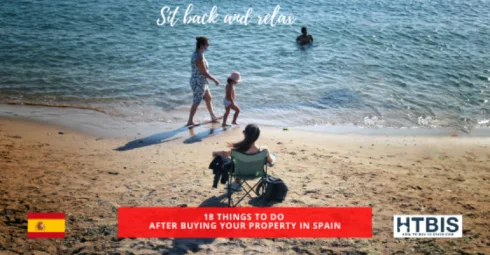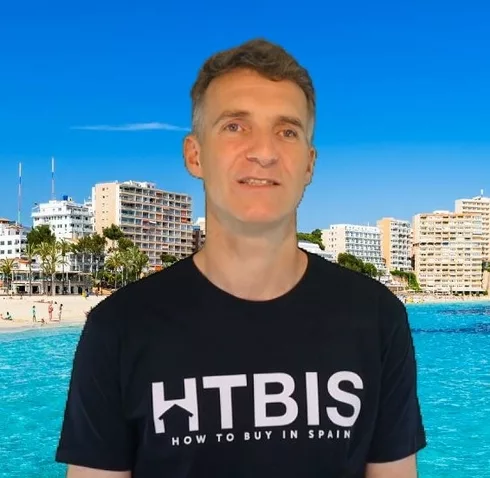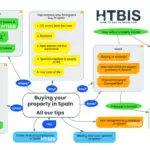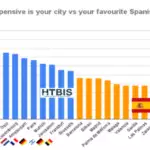 Reading time 4 minutes. Use our table of content for a quick read.
Reading time 4 minutes. Use our table of content for a quick read.
Last Updated on 17/07/2023 by STEPHANE
Click on any flag to get an automatic translation from Google translate. Some news could have an original translation here: News Nouvelles Nieuws Noticias Nachrichten
The 18 things to do after buying your property in Spain
Congratulations! Did you buy your dream property? So, don’t miss our useful tips to enjoy your property from day one and to keep everything under control.
This article is the last one from our detailed series: Our ultimate guide to buying your property in Spain.
-
Take insurance to cover your property
It is very easy to insure a property. In case of an accident, you will be covered should anything happen to the walls, the furniture, and your personal effects as well as your civil liability.
The civil liability guarantee is fundamental because it protects you and your family from any material or immaterial damage caused to a third party.
When should you do it? As soon as you paid the first tranche of the property, you should check that. You can even do it before going to the notary. By doing this, you can cover your property for any event that would happen as soon as you become the owner of the property. Quite often, it means that you are the owner as soon as you signed the purchase act at the notary.
So, don’t forget to insure your property.
We have a very good partner that will provide you with competitive quotes for any property in Spain: follow this link to learn more: insure your holiday home in Spain. In that article you will learn how much does it cost home insurance in Spain? Why you should take home insurance in Spain? and how to choose the best home insurance in Spain?
-
Copy all your purchase documents
It is wise to keep a copy of the purchase contract, the notary act, the proof of payments,… Keep those in a safe or at least on the cloud. Those documents could be useful to prove that you are the owner of the property, to get some service running, … and at a later stage, when you will sell the property you could have to pay a tax on your capital gain. More on that here: tax for property owners in Spain. Another use is that many countries are looking to finance deficits and you could need to prove from where your cash is coming and could need to prove your funds comply with anti-money laundering regulations.
-
Get local experts
If you bought this property and are living abroad: it is not your first home but it is a holiday home or an investment property. In this case, our advice is that you don’t try to manage everything alone. Distance management is nearly impossible and is stressful. Get the help of some local partners: renovation works, property management, tax filling, so many items that you could delegate to a reliable local partner and that will change your experience into a successful one.
Good to know: many services will be much cheaper in spain than in your home country, so try it, you will be surprised.
-
Buying in a multi-unit property?
If you are buying an apartment or a property with many units in the same property, you will have a community manager. This company manages the property for all issues common to all the owners: stairs, garden, roof, facade, pool,… If you hired a lawyer for your property acquisition, most of the time, he will check the situation of the property and the building with the company managing the property. In any case, you need to contact the community manager to make sure he has your details and can contact you.
-
Security checks
It is very important, from day one, to secure your property by changing locks and eventually add or upgrade the current Alarm system. Nowadays you have complete solutions allowing you manage the property access, manage the utility settings and secure your property. Of course, a webcam is quite obvious and doesn’t cost a lot. One of our partners installed a full system allowing us to control access remotely (by phone) and to check outside the property.
-
Connect utilities
Get utilities back and running is important to be able to live on your property. Internet connection, water, gas and electricity is a must. Remember to check payment options, nowadays, you can organise automatic payments.
Interesting to know: utilities are one of the rare things that are more expensive in Spain than the rest of Europe, so make sure you have a good contract and don’t consider it free! Read more on that in our detailed article: The cost of living in Spain.
-
Water heater, gas installation and electrical appliance check
You are not aware of that I guess but if the gas installation was cut for a while, when you want to reopen it, you will need your installation to get certified. It is a good time to check any electrical appliance if any in the kitchen or anywhere else on the property.
Our tip: you will have outdated systems consuming a lot of electricity, as already said electricity is expensive in Spain so it could be wise to upgrade your fridge for a new “A” one and reduce your consumption? Do the math for all your electrical appliances!
-
Smoke and Carbon monoxide detectors
Some EU countries have to have those in your house. Some don’t but it is important to think about those easily available tools that could save your life. Of course, those detectors are even more useful if you have a fire or any apparel that would emit smoke or Carbon monoxide in your property. To our knowledge, it seems that they are not required in Spain by law. We would advise you to check the current regulation with local authorities.
-
Air conditioning check
Many properties have AC installed but many don’t have one in Spain. If you have one, check if it is running smoothly, change filters and eventually get a visit from an expert. From time to time, you will have outdated systems consuming a lot of electricity, as already said electricity is one of the rare things to cost more in Spain than at other places in Europe. Check our article on that: The cost of living in Spain.
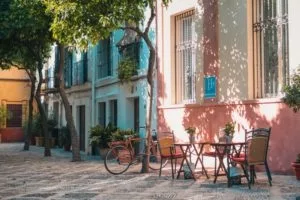
-
Renovation works? Refresh painting? Interior architect?
Before moving in, it is the perfect time for a quick (or not) renovation and to refresh wall paintings. So much easier now without furniture. In Spain, you can find a lot of qualified professionals at good prices. Always better to work with references. As we are active in Spain, we could help you to find some qualified professionals, check it here: find qualified partners for renovation works in Spain.
-
Deep clean of your property by a team of professionals
Before moving in, the last thing you should do is a deep cleaning of your property. Why not ask a team of professionals?
-
New place, time for new furniture?
Why not get some fresh air and change a few pieces of furniture that will fit better with your new space? Either you will get more space or less space but you will need to fit it properly with furniture. Why not take the opportunity to change this old sofa and invest in a new one? The dining table could as well be too large or too small or maybe the composition of the family changed over the years. Make sure to have those two places as comfortable as you want.
Last idea: Time for changing your mattresses? Get some comfort! Calculate the price per night of any mattress, it is not too expensive and surely less than going to a doctor. Remember: you are spending a third of your life in your bed.
-
Create a maintenance schedule
This is the perfect time to create a maintenance schedule for your property: a property needs regular maintenance: cleaning, paintings, Security, Alarm checks, electrical appliance checks,… We all know that a quick regular check will diminish the long term costs of maintenance of your Spanish property. Why not create a dedicated agenda or checklist for your property?
-
Meet your neighbours
Meeting your neighbours is nice and could be useful for both of you: who doesn’t need someone for picking up mail or watering plants while on holidays? At the same time, you will live close to each other, it is always easier to discuss potential issues in a positive context.
-
Time for your housewarming party
Now that you did all the work, it is time to organize the housewarming party you dreamt of for ages. Don’t forget to invite your neighbours and keep them aware of the extra noise. Always better to start nicely.
-
Do you want to get some extra income?
Short term rental?
Do you have an extra bedroom? You are leaving for a few months? You are on holidays? So many opportunities to get some extra cash if you are living in your Spanish property. Of course, if you bought a second home it makes even more sense. We live in a world where it is so easy to get some extra income thanks to Airbnb and other services. There are a lot of regulations around short term rental in Spain, so check it first with our real estate lawyers. Remember that those regulations are different in all the Spanish regions. Don’t forget, managing a property could be a full-time job. To help you out, check the services of our partner assisting all our property owners everywhere in Spain for their holiday rental management.
Long term rental?
If you bought your property as an investment property, you can prefer long term rentals to short term rentals. It would mean less turnover with your tenants and could mean a higher occupancy rate. Don’t forget to take the time to screen your tenants. Remember as well to check the landlord-tenant regulations with our real estate lawyers.
-
Taxes
Investing means taxes. Where should you start? Register to the local city hall or “ayuntamiento” in Spanish and you can give paying instructions for the local taxes called “IBI” which is an abbreviation of “Impuesto sobre Bienes Inmuebles”. Those are collected quarterly and are fixed according to the value of the property. They could increase slightly year on year. Another tax is the tax you have to pay to the finance ministry or “hacienda” in Spanish. If you are living abroad it is form 210. Don’t miss our earlier article on that: What taxes do you have to pay on your Spanish property? Need help? Check it first with our real estate tax advisors. Last but not least, don’t forget the taxes due in your home country.
-
Keep some savings
Last but not least, a house is full of maintenance costs, small ones in the short term but big ones in the long term. Expected ones and unexpected ones. Always better to keep that in mind.
With our team of more than +100 local real estate partners, HowtobuyinSpain helps foreigners to buy real estate in Spain.
The experts from our network are active in all the fields you need:
- Property finders
- B&B
- Lawyers
- Tax
- Architects
- Money Transfer
- Mortgage
- Holiday rental management
- Insure your Spanish property
- Property survey
- Renovation
Looking for an expert in Spain? Ask us directly!
Senior analyst and strategist at HTBIS
Check the full HTBIS team here

